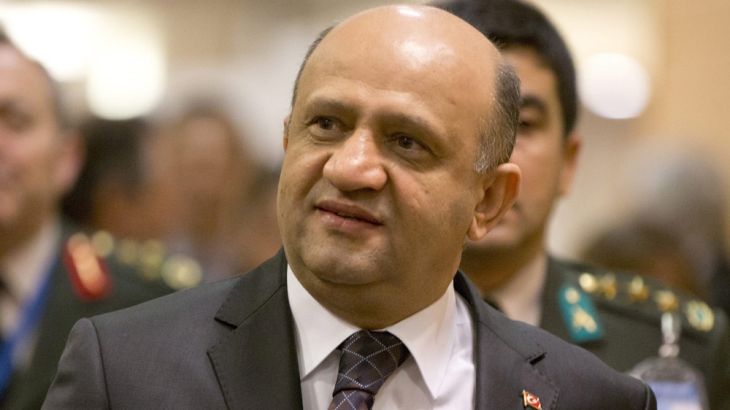
Fikri Isik: NATO countries could’ve been more frank
As Ankara negotiates with Moscow to acquire S-400 missiles, Turkey’s defence minister discusses NATO and security.
Scroll to watch part two of the interview
Turkey has been a NATO strategic ally since 1952. The country located at the intersection of east and west, has had a long relationship with Western nations.
Keep reading
list of 4 itemsNATO allies must do more as Ukraine runs out of ammunition: Stoltenberg
Nordic tensions on the rise amid Russian anger over NATO accessions
Flag of NATO’s 32nd member, Sweden, raised at alliance’s headquarters
But now – in a surprise move – it is turning to Russia to reinforce its defence systems.
Turkey is at the epicenter of every one out of two problems across the world. Thus, Turkey's desire to bolster its own defence system should not be perceived as hostility towards anyone.
Ankara’s negotiations with Moscow to acquire Russian S-400 missiles, a tool that can hit targets up to 400km away and one of the most advanced in the Russian arsenal, have raised questions in the West.
However, Turkey has stated that its commitment to NATO has not changed.
“Turkey’s NATO membership continues and Turkey is fully committed to its obligations towards NATO and Turkey continues to fulfil its obligations,” said Fikri Isik, the Turkish defence minister.
“So, the fact that S-400 missiles are bought doesn’t mean that Turkey will not fulfil its obligations … This is just a method adopted to meet Turkey’s needs related to air and missile defence systems.”
But NATO members remain suspicious towards Russia’s actions.
“We believe that Russians have deliberately deployed [missiles] in order to pose a threat to NATO,” US General Paul Selva said earlier this month.
“Russia and NATO’s relationship … has become very tense, especially due to the invasions of Ukraine and Crimea,” Isik says.
“Turkey and Russia’s relationship doesn’t indicate that Turkey approves the steps taken by Russia … However, the fact that Turkey and Russia are neighbouring countries and the fact that they need to collaborate in certain areas is also a reality that cannot be ignored,” he adds.
As conflicts continue in the region, is Turkey actually preparing a shift in its defence posture? Or is the administration of President Recep Tayyip Erdogan instead being let down by NATO at a crucial time when the Middle East is plagued by instability?
Is Turkey feeling threatened? And if so, by whom?
PART TWO
|
|
On August 24, 2016, Turkey launched a military operation in northern Syria under the code name of Operation Euphrates Shield.
As Turkey, our priorities are very clear for us. We defend the territorial integrity of Syria. Syria should continue as one single state. However, it should be a democratic Syria.
The main goals of the campaign were to maintain border security, to confront the Islamic State of Iraq and the Levant (ISIL) armed group and to prevent the Kurdistan Workers’ Party (PKK) – as well as its affiliates Syrian PYD/YPG – the opportunity to create autonomous zones on Turkey’s doorstep.
Erdogan has previously said the main objective of a Turkish incursion into northern Syria is to clear a 5,000sq-km “safe zone”, vowing to press on towards ISIL’s self-declared capital in the country, Raqqa.
“Raqqa is a city, [that] Daesh [ISIL] considers significantly important, it’s a symbolic city for them. Cleaning it of Daesh is a priority for Turkey as much it is a priority to the world,” Isik says.
The government has said Turkish forces had no intention of staying in Syria once the area had been cleared of both ISIL and Kurdish YPG fighters.
“The reason for the existence of Turkish troops there is obvious. To eliminate the threats against Turkey, clean Daesh (ISIL) and prevent the dominance of other terrorist organisations in this area. After these goals are achieved, Turkish troops will withdraw. You shouldn’t have any hesitations about that,” Isik says.
“At this point, what we specifically want to do, our most essential priority is the territorial integrity of Syria. We don’t want Syria to be divided. We want a democratic Syria. A democratic Syria that reflects all the diversity of the Syrian people and the flag to fly over this land should be the flag of that democratic Syria,” he adds.
On this part of the interview, we discuss the potential threats to Turkey as a result of the conflicts taking place in the region, as well as Ankara’s military goals in Syria.
You can talk to Al Jazeera too. Join our Twitter conversation as we talk to world leaders and alternative voices shaping our times. You can also share your views and keep up to date with our latest interviews on Facebook.